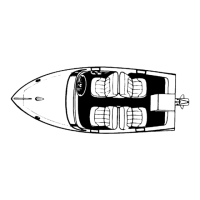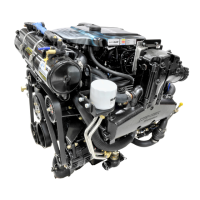1C-22 - TROUBLESHOOTING 90-823225--1 1096
Oil Pressure
Cause Special Information
Measuring oil pressure
Use a good automotive oil pressure test gauge.
Do not rely on the oil pressure gauge in the boat.
Check engine oil level with boat at rest in the water
Oil level should be between the ADD and FULL
marks
Oil level in crankcase above FULL mark
May cause loss of engine RPM, oil pressure
gauge fluctuation, drop in oil pressure, and
hydraulic valve lifter noise at high RPM
Oil level in crankcase below ADD mark
Low oil pressure; oil pressure gauge fluctuation;
internal engine noise and/or damage
Change in oil pressure
This may be a normal condition. Oil pressure
may read high in the cooler times of the day, and
when engine is not up to operating temperature.
As the air temperature warms up and engine is
running at normal opening temperature, it is
normal for oil pressure to drop.
Low engine oil pressure at idle
With modern engines and engine oils, low oil
pressure readings at idle do not necessarily
mean there is a problem. If valve lifters do not
“clatter” (at idle), there is a sufficient volume of
oil to lubricate all internal moving parts properly.
The reason for the drop in oil pressure is that
engine heat causes an expansion of the internal
tolerances in the engine and, also, the oil will
thinout somewhat from heat.
Low engine oil pressure at idle after running at a
high RPM
Refer to No. 5 and 6, preceding
Boats with dual engines
It is not uncommon to see different oil pressure
readings between the two engines, as long as
both engines fall within specifications.
Differences in oil pressure can be attributed to
differences in engine tolerances, gauges, wiring,
senders, etc.
Boats with dual stations Refer to No. 8. preceding

